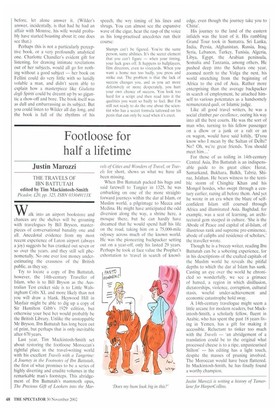Footloose for half a lifetime
Justin Marozzi
THE TRAVELS OF IBN BATTUTAH edited by Tim Mackintosh-Smith Picador, £20, pp. 325. ISBN 0330497 13X Walk into an airport bookstore and chances are the shelves will be groaning with travelogues by Bill Bryson. masterpieces of conversational banality one and all. Anecdotal evidence from my most recent experience of Luton airport (always a joy) suggests he has cranked out seven or so over the years, and they still sell phenomenally. No one ever lost money underestimating the crassness of the British public, as they say.
Try to locate a copy of Ibn Battutah, however, the 14th-century Traveller of Islam, who is to Bill Bryson as the Australian Test cricket side is to Little Walsingham Colts XI, and more likely than not you will draw a blank. Heywood Hill in Mayfair might he able to dig up a copy of Sir Hamilton Gibbs 1929 edition, but otherwise your best bet would probably be the British Library. Unlike the unstoppable Mr Bryson, Ibn Battutah has long been out of print, but perhaps that is only inevitable after 670 years.
Last year, Tim Mackintosh-Smith set about restoring the footloose Moroccan's rightful place in the travel-writing world with his excellent Travels with a Tangerine: A Journey in the Footnotes of Ibn Battutah, the first of what promises to be a series of highly diverting and erudite volumes in the remarkable man's footsteps. This abridgement of Ibn Battutah's mammoth opus, The Precious Gift of Lookers into the Mar vels of Cities and Wonders of Travel, or Travels for short, shows us what we have all been missing.
When Ibn Battutah packed his bags and said farewell to Tangier in 1325. he was embarking on one of the more straightforward journeys within the dar al Islam, or Muslim world, a pilgrimage to Mecca and Medina. He might have anticipated the odd diversion along the way, a shrine here, a mosque there, but he can hardly have dreamed that he would spend half his life on the road, taking him on a 75,000-mile odyssey across much of the known world. He was the pioneering backpacker setting out on a year-off, only his lasted 29 years. Perhaps he took at face value the Prophet's exhortation to 'travel in search of knowl edge, even though the journey take you to China'.
His journey to the land of the eastern infidels was the least of it. His rambling Grand Tour took in Sumatra, Sri Lanka, India, Persia, Afghanistan, Russia, Iraq, Syria, Lebanon, Turkey, Tunisia. Algeria, Libya, Egypt, the Arabian peninsula, Somalia and Tanzania, among others. He pushed deep into the Sahara one year, zoomed north to the Volga the next, his world stretching from the beginning of Africa to the end of Asia. Rather more enterprising than the average backpacker in search of employment, he attached himself to various potentates as a handsomely remunerated gadi. or Islamic judge.
Like all good travel writers, he was a social climber par excellence, oozing his way into all the best courts. He was the sort of man who, turning to his fellow passenger on a dhow or a junk or a raft or an ox wagon, would have said loftily, `D'you know who I mean by the Sultan of Delhi? No? Oh, we're great friends. You should meet him...'
For those of us toiling in 14th-century Central Asia. Ibn Battutah is an indispensable guide to its great cities: Herat, Samarkand, Bukhara, Balkh, Tabriz, Shiraz, Isfahan. He bears witness to the terrible storm of Chinghiz Khan and his Mongol hordes, who swept through a century earlier, razing all before them. And yet he wrote in an era when the blaze of selfconfident Islam still coursed through Africa and illuminated Asia. Baghdad, for example, was a seat of learning, an architectural gem steeped in culture. 'She is the Abode of Peace and capital of al-Islam, of illustrious rank and supreme pre-eminence, abode of caliphs and residence of scholars,' the traveller wrote.
Though he is a breezy writer, reading Ibn Battutah can be a sobering experience, for in his descriptions of the exalted capitals of the Muslim world he reveals the pitiful depths to which the dar al Islam has sunk. Casting an eye over the world he chronicled so wonderfully, we see a grimace of hatred, a region in which disillusion, dictatorships, violence, corruption, cultural stasis, woeful under-achievement and economic catastrophe hold sway.
A 14th-century travelogue might seem a little arcane for modern readers, but Mackintosh-Smith, a scholarly fellow, fluent in Arabic, who has spent the past 18 years living in Yemen, has a gift for making it accessible. Reluctant to tinker too much with the Travels — 'an abridgement of a translation could be to the original what processed cheese is to a ripe, unpasteurised Stilton' — his editing has a light touch, despite the masses of pruning involved. The Moroccan would have been flattered. In Mackintosh-Smith, he has finally found a worthy champion.
Justin Marozzi is writing a history of Tamerlane for HarperCollins.


























































































 Previous page
Previous page